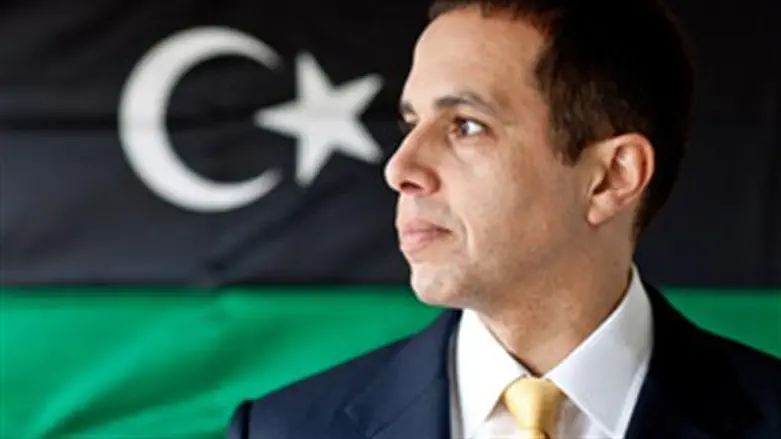
Libya's revolutionaries have reclaimed the old red, black and green flag with its star and crescent that served the kingdom from independence in 1951 to Muammar Qaddafi’s coup in 1969. They have reclaimed its anthem with its words about sacrifice, liberation and never going back to live in chains — words written in fact to commemorate the fight against the Italians.
Libyans argue Qaddafi robbed them of their identity and history - and that to rebuild their nation they must reconnect with it. Stalls in Benghazi sell revolutionary memorabilia — badges, caps, pens, key rings and other assorted items with the old/new flag. There are photos of Omar Mukhtar, the "Lion of the Dessert," who fought the Italians. And there are pictures of former King Idris with nephew Crown Prince Hassan.
It was Idris, as head of the powerful Senussi movement and an ally of the Ottomans, who fought the British and French during World War I. He then headed the struggle against the Italian colonizers in the 1920s from exile in Egypt; Omar Mukhtar was his commander. That fight continued through to World War II, this time with Idris as an ally of the British and French. It was he who finally led Libya to independence in 1951 - only to be overthrown by Qaddafi in 1969.
There is an obvious affection for the old king in Libya. Articles about him appear in the new press. With no stain of political or financial corruption attached to him, he is now seen as a man of integrity and honor — the complete antithesis of Qaddafi. Twice he tried to abdicate to devote himself to study and prayer.
Moreover, despite Qaddafi’s efforts to eradicate every last memory of the Senussi order — to the point of smashing the graves of Senussi members at Al-Jaghbub and scattering their bones in the desert — it is still greatly revered. Support for the house of Senussi is powerfully strong in eastern Libya, probably stronger than at any time since the early 1960s.
A restoration movement has been started in Benghazi. “We’ve brought back the flag, the anthem,” said one of the volunteers at the TNC’s press registration offices, “why not the monarchy?”
Its not an unprecedented idea. After fascist dictator Francisco Franco's death in 1975, Juan Carlos I de Borbףn, the present King of Spain, succeeded him and served not only as a symbol of continuity and stability, but also pressed to hasten the transition from fascism to a democratic constitutional monarchy. Today Juan Carlos I's remains a popular, hands-off monarch with one of the lowest royal budgets in the world.
Like Spain’s restoration, the aim is not to have a politically active monarchy as is common in the Arab world, but a strictly limited constitutional one, with the king as a living symbol of Libyan unity, but who would not be allowed to take part in political affairs. That is also what the would-be king, Crown Prince Mohammed Al-Rida Al-Senussi, proposes. However, he also says that it is up to the Libyan people to decide what they want — a monarchy or a republic — and that he will support whatever they decide.
Early on in the revolution Al-Senussi gave a number of press interviews strongly supporting it. He called for airstrikes against Qaddafi’s forces to protect civilians before the UN authorized the no-fly zone. However, since speaking to the European Parliament on April 20, he has become relatively tight-lipped about his plans, leading to suggestion that pressure has been put on him to lower his profile.
The TNC’s view on the matter is difficult to assess. It has published its road map for a new Libya entitled “A Vision of a Democratic Libya” in which it says there will be “free and fair parliamentary and presidential elections” — which suggests that Libya will become a republic. But last month TNC chairman Mahmoud Jibril, while reaffirming the roadmap, also said that it would be up to the people to decide whether there would be a return to monarchy.
“If there isn’t a referendum on it,” one Libyan woman who works for an international relief organization in Benghazi told reporters last week, “there will be trouble.”
Other Libyan officials associated with the TNC worry the issue of monarchy could prove divisive.
“Personally, I’m loyal to the Senussis and I would love to see them restored. If it were left to Cyrenaicans (eastern Libyans), there would probably be an 80-percent vote in favor of bringing back the monarchy. But in the west, there isn’t this loyalty. Unless the people of Tripoli have reason to change their minds, I do not think that they will support a restoration — and there are more of them than there are of us. We have to go with what the majority wants.”
But the Senussis are a critical part of the lost sense of identity Libyans so desperately want to reconnect with and are - as a result - back on the agenda.
Whether they are part of Libya’s future remains to be seen.